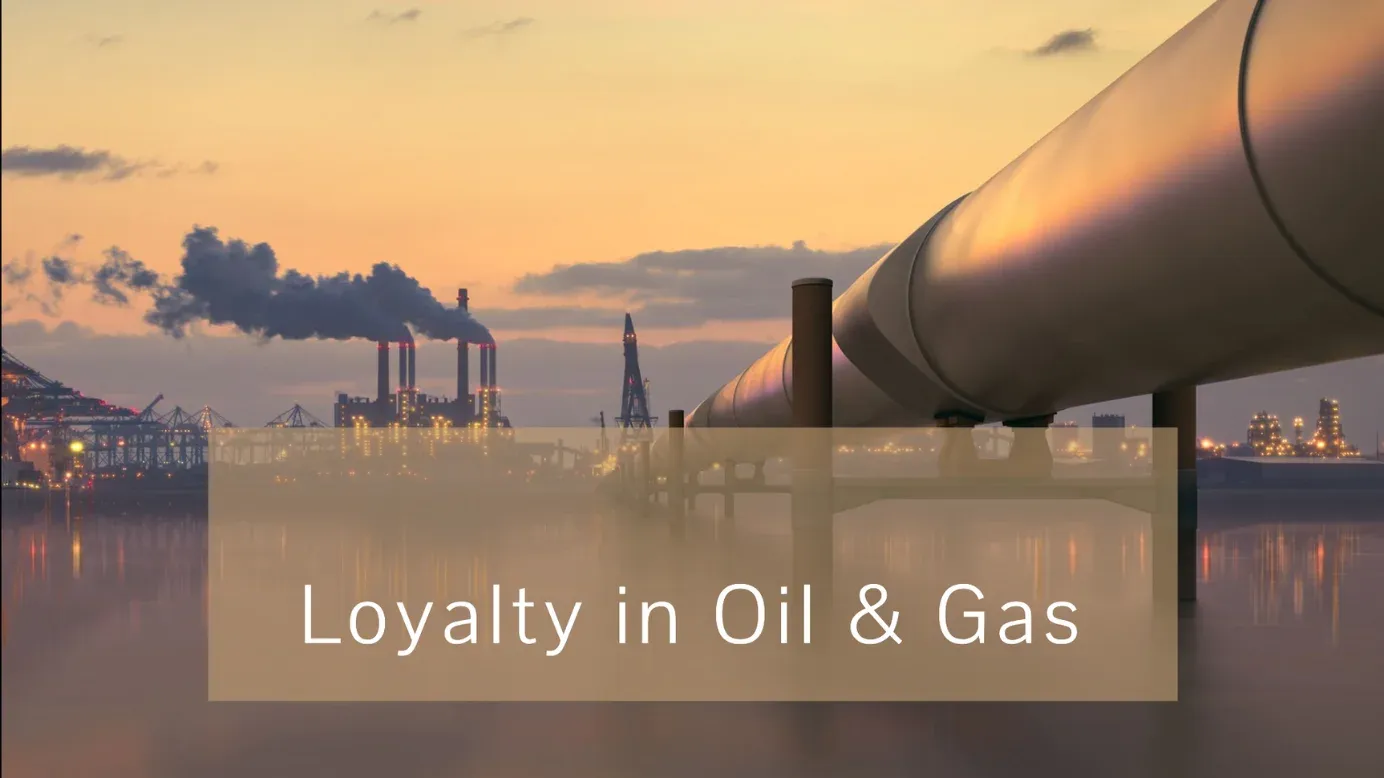On this page
The oil and gas industry is undergoing transformative changes, making customer loyalty a top priority. As consumer behaviors shift, fuel retailers must adapt by leveraging oil and gas loyalty programs to retain customers and drive engagement. Recent research reveals that about 36% of companies in this sector are investing in analytics and big data to create effective fuel loyalty programs that align with evolving customer needs.
Fuel retailers face unique challenges, including highly regulated prices, slim margins, and growing environmental concerns. Despite these obstacles, gas rewards programs offer an opportunity to boost non-fuel sales, provide personalized experiences, and create lasting emotional connections with customers. By offering the best fuel rewards programs, companies can capture new revenue streams while meeting the demands of today’s discerning consumers.
This blog explores how fuel loyalty schemes can help oil and gas companies increase revenue, enhance customer engagement, and foster loyalty. Through actionable strategies and real-world case studies, discover how to build the best gas rewards program that stands out in this competitive industry.
Benefits of loyalty programs in the oil and gas industry
Implementing effective loyalty programs can significantly benefit oil and gas companies, helping them drive customer engagement, increase revenue, and gain valuable insights. Here are some critical advantages of loyalty programs in the fuel retail industry:
1. Increased customer engagement and loyalty
Gas rewards programs are a powerful tool for driving customer engagement and retention. According to a study by KPMG, participation rates in mature markets for fuel loyalty programs range from 25% to 40%, with some chains seeing loyalty program transactions account for up to 70% of total fuel sales. By offering rewards and personalized experiences, loyalty programs encourage customers to return to the same fuel brand, fostering long-term loyalty.
2. Improved customer insights and targeted marketing
Loyalty programs provide valuable data on customer behavior, preferences, and purchase patterns. By analyzing this data, oil and gas companies can gain deep insights into their customer base and create targeted marketing campaigns. The main goal of data analysis is to determine everything that can affect sales, margin, profit, and customer loyalty in the future.
3. Increased non-fuel sales and revenue
While fuel sales are the primary revenue driver for oil and gas companies, loyalty programs can also help boost non-fuel sales. According to the Association For Convenience & Fuel Retailing, fuel retailers typically see profitability decrease as prices rise and increase when prices fall due to the volatility in the wholesale price of gasoline.
By offering rewards for in-store purchases and creating a positive customer experience, loyalty programs can drive additional revenue from non-fuel sales and yield much higher profit margins than fuel sales alone.
4. Competitive Advantage and Brand Differentiation
In an industry where fuel is largely undifferentiated, gas rewards programs provide a way for companies to stand out. Unique rewards, such as points redeemable for car services or partner discounts, create a distinctive value proposition.
As Sushant Rabra, partner at a leading consulting firm, notes, "For the fuel retailers, consumer experience is an upcoming competitive milestone. Fuel is an undifferentiated product, so retailers need to develop a strategy and opt for digitalization techniques to stand out in the crowd by catering to upgraded forecourt experiences and benefits for customers." By offering unique rewards and experiences, loyalty programs can give oil and gas companies a competitive edge and attract customers away from competitors.
Importance of employee loyalty in oil and gas business
The oil and gas industry faces unique challenges that make loyalty programs essential for driving customer engagement and revenue growth. Here are some key reasons why loyalty programs are crucial for fuel retailers:
1. Intense competition and price sensitivity
The fuel retail industry is highly competitive, with customers being extremely price-sensitive, especially in the current economic climate. The fuel retail industry faces significant challenges.
Despite steady demand for petrol, the cost-of-living crisis and global conflicts have made drivers highly sensitive to prices. Loyalty programs can help fuel retailers differentiate themselves from competitors by offering personalized rewards and experiences beyond discounted fuel prices.
2. Changing customer expectations and behaviors
As fuel retailers evolve into complex retail outlets, customer expectations are changing. Customers now look for a wide range of services beyond fuel and convenience, such as electric car charging stations, parcel pick-up areas, and more.
Loyalty programs can help retailers adapt to these changing expectations by offering rewards for a broader range of purchases and services. An increasing number of gas stations are shifting towards convenience and alternative retail offerings. Petrol brands require tools to transition customers from fuel purchases to retail shopping, fostering new and robust shopping habits.
3. Importance of non-fuel sales and revenue
While fuel sales are the primary revenue driver for oil and gas companies, non-fuel sales are becoming increasingly important. B2C customers buy less fuel per visit, but frequent gas stations more often and make more non-fuel purchases than B2B drivers. Loyalty programs can help drive additional revenue from non-fuel sales by offering rewards for in-store purchases and creating a positive customer experience.
4. Need for customer insights and targeted marketing
Loyalty programs provide valuable data on customer behavior, preferences, and purchase patterns. By analyzing this data, oil and gas companies can gain deep insights into their customer base and create targeted marketing campaigns. Data analysis aims to identify factors affecting sales, margins, profits, and loyalty so the firms can send the right offer through the best channel at the optimal time to influence shopping habits.
Loyalty programs are essential for oil and gas companies to navigate the intense competition, changing customer expectations, and the need for non-fuel revenue and customer insights in the fuel retail industry.
What offers and rewards are valued most in fuel loyalty programs?
Fuel retailers must carefully consider the rewards and offers that will resonate most with their customers to drive engagement and loyalty. Several key factors influence the perceived value of loyalty program rewards in the fuel industry:
1. Convenience and accessibility
One of the most critical factors for fuel customers is the convenience and accessibility of the loyalty program. Loyalty programs for gas stations should be free to join. The benefits should be significant enough to justify participation without an entry fee. The registration process should also be quick and easy, allowing new drivers to sign up at checkout effortlessly. Customers want a frictionless experience where they can easily earn and redeem rewards.
2. Personalized offers and experiences
Fuel customers also value personalized offers and experiences tailored to their needs and preferences. Customize rewards and engagement based on desired behaviors across different customer segments, varying by location, age group, life events such as birthdays and anniversaries, and more. By leveraging customer data and analytics, fuel retailers can provide highly relevant and valuable rewards.
3. Instant gratification and flexibility
Fuel customers often seek instant gratification and flexibility in their loyalty program rewards. One essential consumer trait is a preference for rewards that provide immediate gratification. Customers want to earn and redeem rewards quickly without complex rules or restrictions.
4. Partnerships and coalition rewards
Partnering with other brands and offering coalition rewards can also be highly valuable for fuel loyalty programs. Implementing or joining a coalition loyalty program presents a significant opportunity for fuel retailers.
It offers cost-effectiveness, jumpstarts promotions, facilitates cross-industry collaboration, provides time-sensitive incentives, encourages frequent usage, and boosts engagement rates. By allowing customers to earn and redeem rewards across a wide range of brands and categories, fuel retailers can increase the perceived value of their loyalty program.
Fuel customers value loyalty program rewards and offers that are convenient, personalized, provide instant gratification, and offer flexibility and partnership opportunities. By understanding these key preferences, fuel retailers can design effective loyalty programs that drive long-term customer engagement and retention.
Case studies of loyalty in the oil and gas industry
1. Exxon Mobil Rewards+™ program
ExxonMobil, one of the world's largest energy providers, sought to enhance customer engagement through an effective loyalty program.
ExxonMobil wanted to create a loyalty program that would:
- Increase customer engagement and retention
- Provide consumers with savings and rewards on fuel and convenience store purchases
- Integrate with a multi-partner loyalty coalition program involving significant retail, streaming, telecommunications, and finance brands.
To address these challenges, ExxonMobil launched a multi-partner loyalty coalition program in 2015, which required complex technical integrations to ensure real-time data flows across all partner environments. They implemented loyalty management to power the program and extended its reach to over 12,000 Exxon and Mobil stations.
The program has yielded significant results:
- The Exxon Mobil Rewards+ loyalty program has reached the $100 million milestone in member savings in its first five years since launch.
- The program has provided consumers with the best brand experience, allowing members to earn points on their purchases and redeem them for savings.
2. THE FUEL REWARDS® PROGRAM
Shell is a global energy company that offers a wide range of products and services, including fuel, lubricants, and energy solutions. High fuel prices can be a significant financial burden for consumers, especially those who rely on their vehicles for daily transportation. The Shell Fuel Rewards Program seeks to alleviate this problem by offering savings and rewards to its members.
Solutions:
The Shell Fuel Rewards Program offers several solutions to help customers save money on fuel:
- Complimentary gold status: Joining the program automatically grants members Gold Status, which provides a 5 cents per gallon discount on every fill-up.
- Platinum status: Members can achieve Platinum Status by filling up 12 times in 3 months (or 6 times with Shell V-Power NiTRO+ Premium Gasoline). This unlocks a 10 cents per gallon discount, double the savings on selected convenience store items, and exclusive experiential rewards.
- Online shopping and dining rewards: Members can earn additional bonuses by shopping and dining with partner brands through the FuelRewards.com website.
- Stacking rewards: Members can combine their Platinum or Gold Status discounts with partner rewards to maximize their savings at the pump.
The Fuel Rewards® program at Shell, recognized by Bond Brand Loyalty's 2021 Loyalty Report™ as the top Loyalty Program in the Gas and Convenience category, connects brands with over 25 million consumers nationwide.
3. BP Driver Rewards
BP is one of the world's largest energy companies. It produces 18.4 million tonnes of oil annually and drives economic growth with 74,000 employees across more than 70 countries. The company is a significant player in the oil and gas industry, focusing on the exploration, production, refining, and marketing of petroleum products. BP's loyalty program, BP Driver Rewards, offers the following solutions:
- Cents-per-gallon fuel savings: The program rewards consumers with 5 cents off per gallon of fuel for every 20 gallons purchased, with a minimum of 2 transactions. This provides an automatic discount on future fuel purchases.
- Integrated with existing rewards: The BP Driver Rewards program integrates with other existing BP rewards programs, such as the BP Visa and BP Card, allowing consumers to stack discounts and maximize their savings.
BP has achieved significant outcomes. With U.S. headquarters in La Palma, Calif. (West) and Warrenville, Ill. (East), BP now markets over 15 billion gallons of gasoline annually to U.S. consumers through more than 11,000 retail outlets and supplies over four billion gallons of fuel each year to fleets, industrial users, auto and truck manufacturers, railroads, and utilities.
4. Emirates National Oil Company Group
ENOC (Emirates National Oil Company) is a leading integrated global oil and gas player operating across the energy sector value chain. It was founded in 1993 and is headquartered in Dubai, United Arab Emirates. Before the UAE deregulated oil and gas prices, there were no loyalty programs in the GCC region, presenting a greenfield opportunity for ENOC to be a first mover.
ENOC has launched its "Yes" Rewards program. The objective was to create a mobile-first loyalty program that could cater to the distinctive requirements of customers in the Middle East, encompassing ENOC's fuel, automotive, and retail offerings.
- Within the first month of launch, the "Yes" Rewards program gained over 200,000 members.
- Each loyalty campaign generated 2-3 times higher turnover for ENOC.
- In 2023, the "Yes" Rewards program was nominated for two categories at the International Loyalty Awards: Best Customer Experience and Best Loyalty/Benefits in a Financial Product.
Fueling customer connections in the oil and gas industry with Loyalife
Loyalife empowers oil and gas companies to overcome industry-specific challenges and build customer loyalty through innovative and tailored solutions. Designed to cater to a highly price-sensitive and commoditized market, Loyalife offers businesses the tools to create value-driven loyalty programs that drive engagement and retention.
Offline and mobile integration
Loyalife enables seamless integration with both offline and mobile systems, ensuring a unified loyalty experience across all touchpoints. Customers can engage in-store or via a mobile app, with features like real-time point tracking, exclusive app-based rewards, and store-level promotions.
Gamification for enhanced engagement
Turn routine transactions into engaging experiences with gamification. Loyalife supports interactive elements like points, badges, and leaderboards to excite customers and deepen their connection with your brand.
Addressing price sensitivity
Loyalife’s flexible loyalty engine allows businesses to reward customers with discounts on fuel, points for in-store purchases, and other perks that go beyond cost savings delivering higher perceived value.
Sustainability integration
Align loyalty programs with eco-conscious customer expectations by incentivizing sustainable choices, such as rewards for using cleaner fuels or participating in recycling initiatives.
Loyalife provides oil and gas companies with the tools to create loyalty programs that engage customers, promote sustainability, and address price sensitivity, ensuring long-term growth and customer retention. Fuel your loyalty strategy with Loyalife today!
Conclusion
Loyalty programs are critical for oil and gas companies looking to drive customer engagement, increase revenue, and gain valuable insights into the highly competitive fuel retail industry. By offering personalized rewards, seamless experiences, and unique benefits beyond discounted fuel prices, loyalty programs can help fuel retailers differentiate themselves from competitors and foster long-term customer loyalty.
As customer expectations and behaviors continue to evolve, oil and gas companies must adapt their loyalty strategies to cater to the changing needs of their customers. By leveraging data analytics, targeted marketing, and innovative partnerships, fuel retailers can create loyalty programs that deliver real value and drive sustainable growth in the years ahead.
FAQ'
1. What is the importance of loyalty in the oil and gas industry?
Loyalty programs in the oil and gas industry help retain customers in a highly price-sensitive market. By offering incentives such as points, discounts, and exclusive benefits, these programs foster long-term customer relationships and enhance brand loyalty.
2. What makes the best fuel rewards program?
The best fuel rewards program provides meaningful rewards, such as discounts on fuel, points for in-store purchases, and additional perks like car washes or partner offers. It should also be easy to use and accessible via mobile apps or loyalty cards.
3. How do fuel loyalty programs work?
Fuel loyalty programs reward customers for their purchases at fuel stations. Members earn points or discounts that can be redeemed for fuel, in-store products, or partner services, enhancing engagement and retention.
4. What are gas rewards programs, and how do they benefit customers?
Gas rewards programs allow customers to earn benefits like cashback, discounts, or points for every fuel purchase. These rewards provide savings and additional incentives to choose a specific fuel brand over competitors.
5. How do fuel loyalty schemes address price sensitivity?
Fuel loyalty schemes add value beyond price savings by offering rewards, exclusive deals, and personalized offers. These programs provide customers with tangible benefits, making them more likely to remain loyal even in price-sensitive scenarios.
6. What are some examples of successful oil and gas loyalty programs?
Examples include Shell Go+, Exxon Mobil Rewards+, and BPme Rewards. These programs focus on delivering convenience, personalized offers, and multi-channel engagement to enhance customer satisfaction and retention.
7. How do fuel rewards loyalty programs integrate with mobile apps?
Modern fuel rewards loyalty programs often include mobile app features, such as real-time point tracking, digital payment options, and exclusive app-only rewards. This makes the programs more accessible and user-friendly.
8. What is the role of gamification in gas reward programs?
Gamification in gas reward programs introduces elements like sweepstakes, challenges, and auctions to create excitement and engagement. This strategy keeps customers interested and encourages frequent participation.
9. How can businesses create the best rewards program for gas?
To create the best rewards program for gas, businesses should focus on offering personalized rewards, seamless offline and online integration, and partnerships with other brands. Incorporating sustainable practices can also appeal to environmentally conscious customers.
10. How do oil and gas loyalty programs support sustainability?
Oil and gas loyalty programs can encourage eco-friendly behavior by rewarding customers for using cleaner fuels, participating in recycling initiatives, or opting for digital receipts. These programs align with consumer expectations for sustainability and social responsibility.









